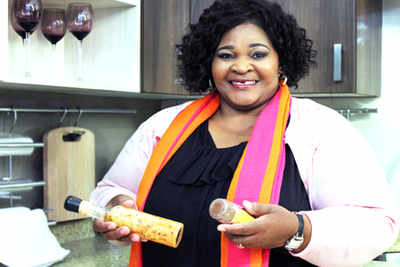Trending
This story is from July 25, 2015
Fresh out of Nelson Mandela’s kitchen
His personal chef for 22 years, Chef Xolisawa Ndoyiya, talks about the simple food habits of Nelson Mandela and shares a couple of traditional South African recipes

His personal chef for 22 years, Chef Xolisawa Ndoyiya, talks about the simple food habits of Nelson Mandela and shares a couple of traditional South African recipes
Nelson Mandela’s personal chef of more than two decades is sitting across from me at a crowded restaurant in Gurgaon’s CyburHub. It is one of those surreal moments that stay with you for a very long time.She is in town for a special promotion of South African culinary arts and traditions– organised by the country’s department of trade and industry.
Chef Xolisawa (pronounced, Ko-lees-wah) Ndoyiya speaks above the din, trying to give a glimpse of the person behind the persona: Nelson Mandela. For the great humanitarian and the head of state of South Africa that he was, Mandela had simple taste in food. Amidst his busy schedules and frequent travels, all he wanted was someone to make him home-cooked food or ukutya kwasekhata, as it is called in isiXhosa, his native language.
A Queenstown resident, Xolisawa joined Mandela in November 1992, and came with him from African National Congress (ANC) into the South African government. For a young chef, it sounds like an immense career leap to be offered the role of a personal chef for the President. Chef Xoli, as she’s called lovingly, says that she was “obviously very excited” to be considered for the coveted role and prepared for days for the interview. To her surprise, the only question Mandela asked during the interview was – “Can you make simple home-cooked food?”
It is this kinship and dedication towards the leader, not just as his personal chef but someone who truly believes in her Madiba’s ideologies, that is aptly reflected in her book: Ukutya Kwasekhaya: Tastes from Nelson Mandela’s Kitchen. “I was a baby when Madiba went to jail and, without his long walk, my life and the lives of all South Africans would have been so much worse. I feel privileged to have fed him as President and private citizen,” she says in the book.
So what kind of food did Nelson Mandela really like? I ask, thinking that she might be getting this question a lot. But she replies with a disarming candour. “Madiba liked traditional cooking. If you didn’t give him home-style meals for two days in a row, he’d say – “What’s wrong? Why aren’t you feeding me well?”” she goes on, “He wasn’t really a fussy eater, but he did have a sweet tooth.”
Chef Xoli speaks of Mandela with a fondness that can only be present in a person who has cooked and cared for him like her own. Like when the doctors would encourage Mandela to stick to his wholesome, balanced diet that was customised according to his daily activity, health and age, chef Xoli would indulge him every now and then just to see him gleefully digging into his favourite sweet-dish.
She says she is grateful she had the opportunity to contribute to Mandela’s life through food that fuelled him and owes everything that she is today to those 22 years of service to him. She has recently opened a catering and hospitality company Eat, Live, Love– that works towards gathering support and creating awareness about African renaissance cuisine by creating delectable and contemporary dishes using simple and fresh ingredients that are found in most homes throughout South Africa.
She shares two easy-to-make, traditional home-food South African recipes, that she cooked for Nelson Mandela.
Boiled Umleqwa (Farm Chicken)

Serves 6 – 8
1 large farm chicken, cut t 8 pieces
1 medium onion, (about 100g) roughly chopped
750 ml (3 cups) water
30 ml (2 tbsp) cake flour
Salt and pepper, to taste
Method
Place the chicken, onion and 500 ml (2 cups) of water in a large pot and bring to boil, then reduce the heat and simmer uncovered over medium heat until chicken is cooked, roughly 30 minutes.
Whisk the remaining water with the flour to make a paste and add this to the chicken.
Continue cooking until a thick grey forms, about 30 minutes.
Season and serve.
Samp and Beans

Serves 6 – 8
500g samp (crushed maize), well rinsed
800 g dried sugar beans, well rinsed
Water, to cover
2 beef stock tubes
Salt and white pepper to taste
45ml (3 tbsp) butter
Method
Place the samp and beans in a pot, cover with water and bring to the boil, then reduce the heat and cook until soft, at least 2 hours. Do not stir or it will become excessively starchy, but keep checking to see that the mixture is not sticking to the bottom of the pot and add water if necessary. After about an hour add the stock tubes. When the mixture is soft and cooked through, strain off the remaining water.
Season and stir in the butter. Serve with meat (stew).
Nelson Mandela’s personal chef of more than two decades is sitting across from me at a crowded restaurant in Gurgaon’s CyburHub. It is one of those surreal moments that stay with you for a very long time.She is in town for a special promotion of South African culinary arts and traditions– organised by the country’s department of trade and industry.
Chef Xolisawa (pronounced, Ko-lees-wah) Ndoyiya speaks above the din, trying to give a glimpse of the person behind the persona: Nelson Mandela. For the great humanitarian and the head of state of South Africa that he was, Mandela had simple taste in food. Amidst his busy schedules and frequent travels, all he wanted was someone to make him home-cooked food or ukutya kwasekhata, as it is called in isiXhosa, his native language.
A Queenstown resident, Xolisawa joined Mandela in November 1992, and came with him from African National Congress (ANC) into the South African government. For a young chef, it sounds like an immense career leap to be offered the role of a personal chef for the President. Chef Xoli, as she’s called lovingly, says that she was “obviously very excited” to be considered for the coveted role and prepared for days for the interview. To her surprise, the only question Mandela asked during the interview was – “Can you make simple home-cooked food?”
Her job entailed that she catered to everything from family get-togethers to political strategy sessions, and involved working closely with Mandela to decide the menu each time. She also took care of feeding Mandela’s five grandchildren – Mandla, Ndaba, Mbuso, Rochelle and Andile – who would often come to stay with him. “Madiba loved to come back to a noisy house filled with children,” says the chef, adding, “I think, that’s because his own incarceration had taken away the joy of watching his own children grow.”
It is this kinship and dedication towards the leader, not just as his personal chef but someone who truly believes in her Madiba’s ideologies, that is aptly reflected in her book: Ukutya Kwasekhaya: Tastes from Nelson Mandela’s Kitchen. “I was a baby when Madiba went to jail and, without his long walk, my life and the lives of all South Africans would have been so much worse. I feel privileged to have fed him as President and private citizen,” she says in the book.
So what kind of food did Nelson Mandela really like? I ask, thinking that she might be getting this question a lot. But she replies with a disarming candour. “Madiba liked traditional cooking. If you didn’t give him home-style meals for two days in a row, he’d say – “What’s wrong? Why aren’t you feeding me well?”” she goes on, “He wasn’t really a fussy eater, but he did have a sweet tooth.”
Chef Xoli speaks of Mandela with a fondness that can only be present in a person who has cooked and cared for him like her own. Like when the doctors would encourage Mandela to stick to his wholesome, balanced diet that was customised according to his daily activity, health and age, chef Xoli would indulge him every now and then just to see him gleefully digging into his favourite sweet-dish.
She says she is grateful she had the opportunity to contribute to Mandela’s life through food that fuelled him and owes everything that she is today to those 22 years of service to him. She has recently opened a catering and hospitality company Eat, Live, Love– that works towards gathering support and creating awareness about African renaissance cuisine by creating delectable and contemporary dishes using simple and fresh ingredients that are found in most homes throughout South Africa.
She shares two easy-to-make, traditional home-food South African recipes, that she cooked for Nelson Mandela.
Boiled Umleqwa (Farm Chicken)

Serves 6 – 8
1 large farm chicken, cut t 8 pieces
1 medium onion, (about 100g) roughly chopped
750 ml (3 cups) water
30 ml (2 tbsp) cake flour
Salt and pepper, to taste
Method
Place the chicken, onion and 500 ml (2 cups) of water in a large pot and bring to boil, then reduce the heat and simmer uncovered over medium heat until chicken is cooked, roughly 30 minutes.
Whisk the remaining water with the flour to make a paste and add this to the chicken.
Continue cooking until a thick grey forms, about 30 minutes.
Season and serve.
Samp and Beans

Serves 6 – 8
500g samp (crushed maize), well rinsed
800 g dried sugar beans, well rinsed
Water, to cover
2 beef stock tubes
Salt and white pepper to taste
45ml (3 tbsp) butter
Method
Place the samp and beans in a pot, cover with water and bring to the boil, then reduce the heat and cook until soft, at least 2 hours. Do not stir or it will become excessively starchy, but keep checking to see that the mixture is not sticking to the bottom of the pot and add water if necessary. After about an hour add the stock tubes. When the mixture is soft and cooked through, strain off the remaining water.
Season and stir in the butter. Serve with meat (stew).
End of Article
FOLLOW US ON SOCIAL MEDIA








